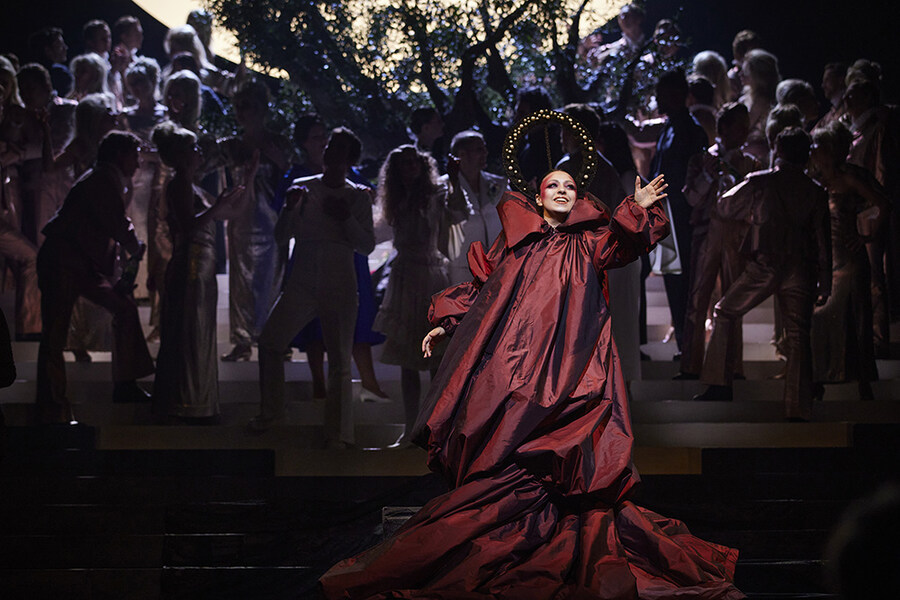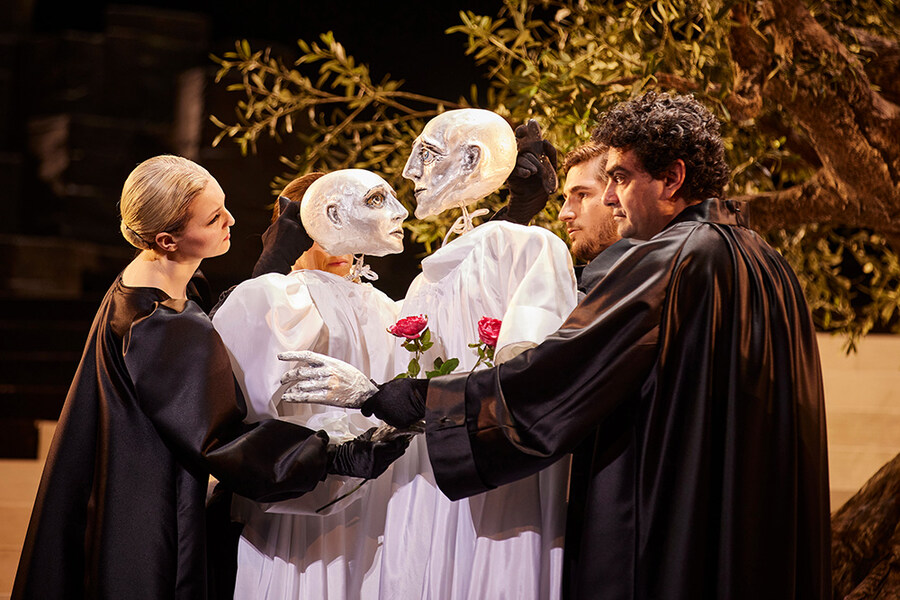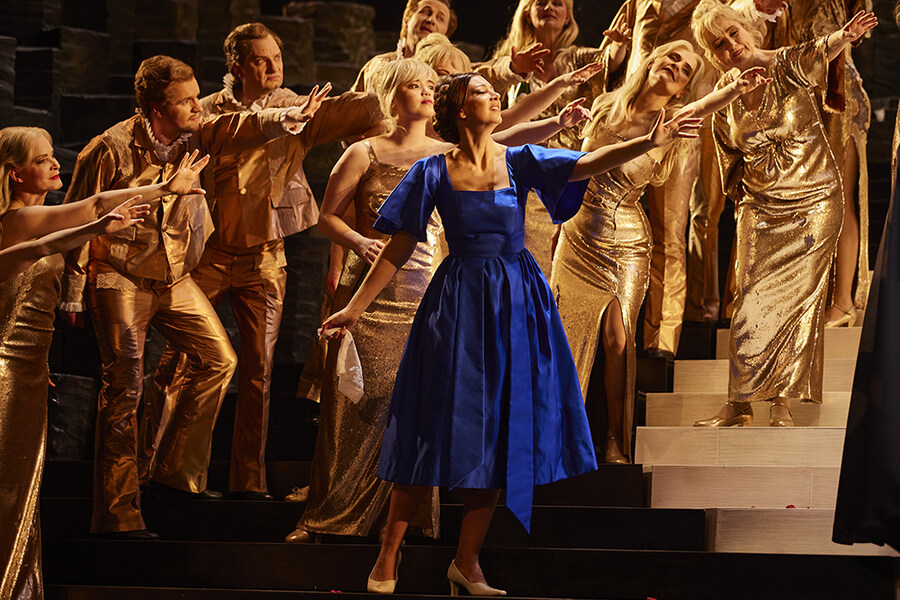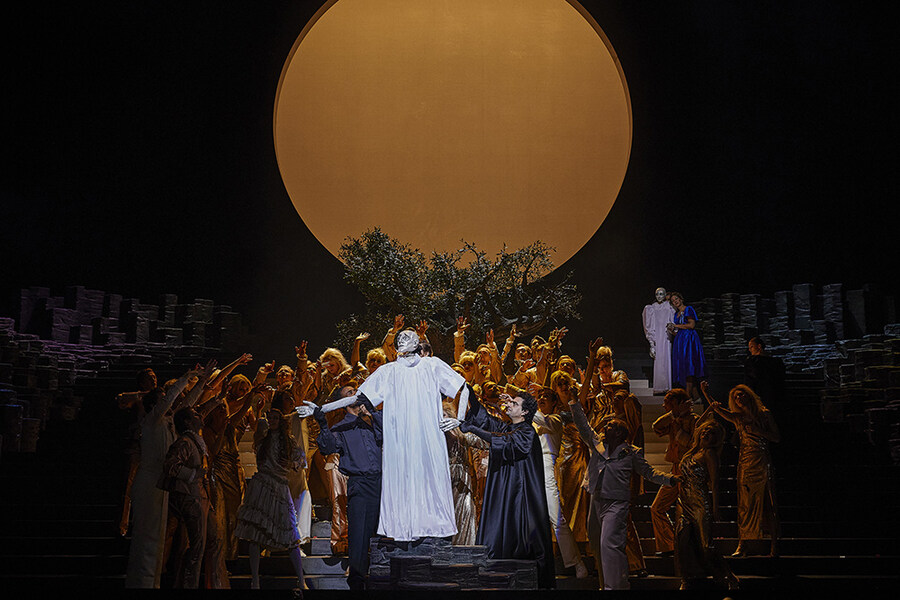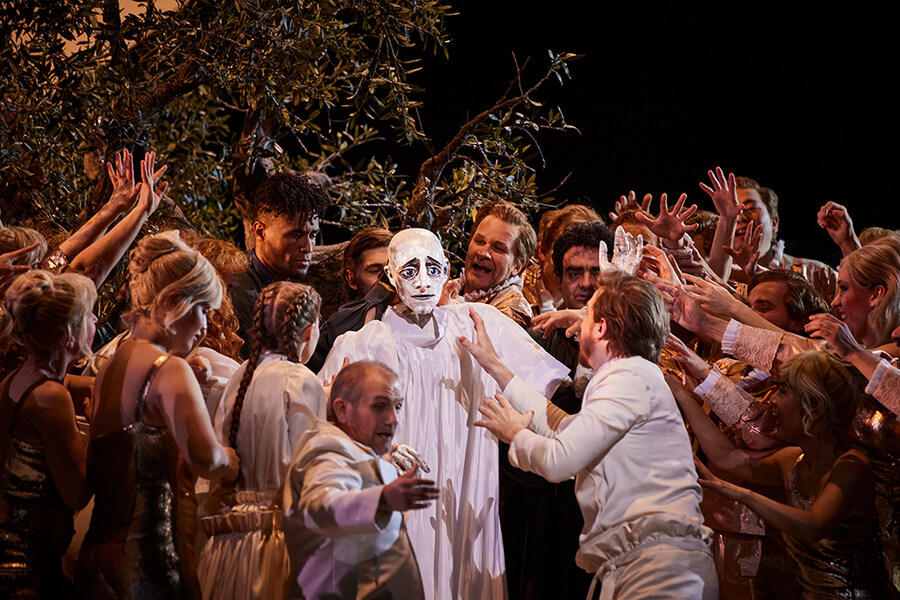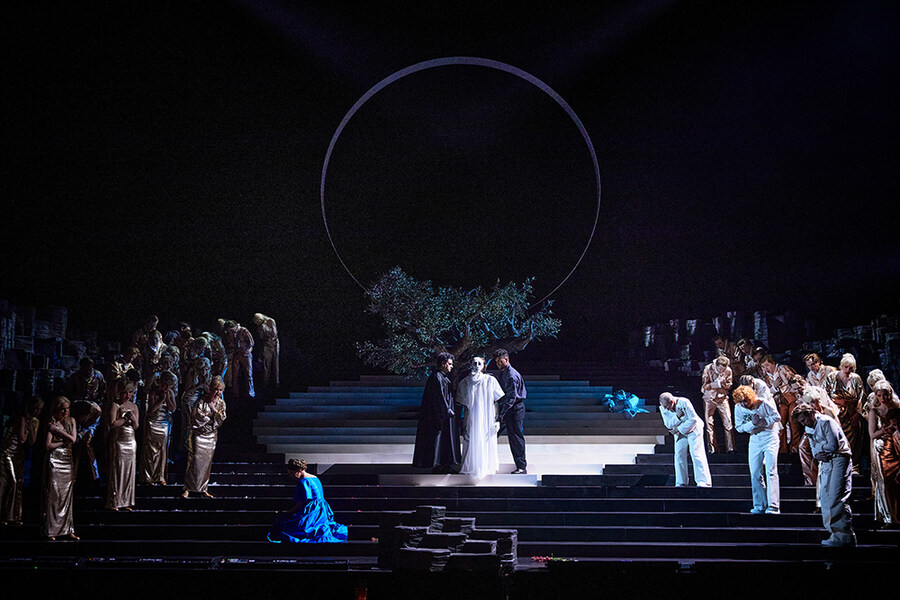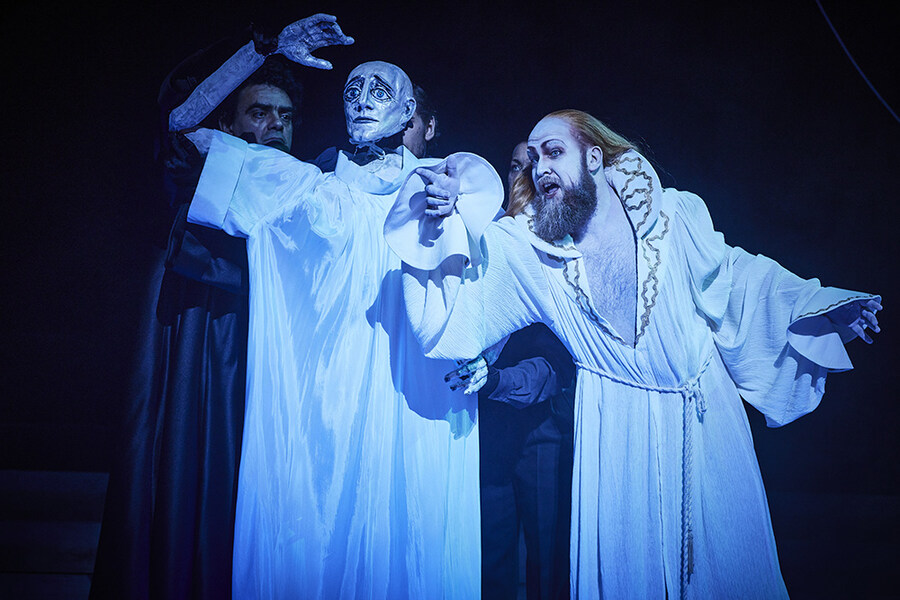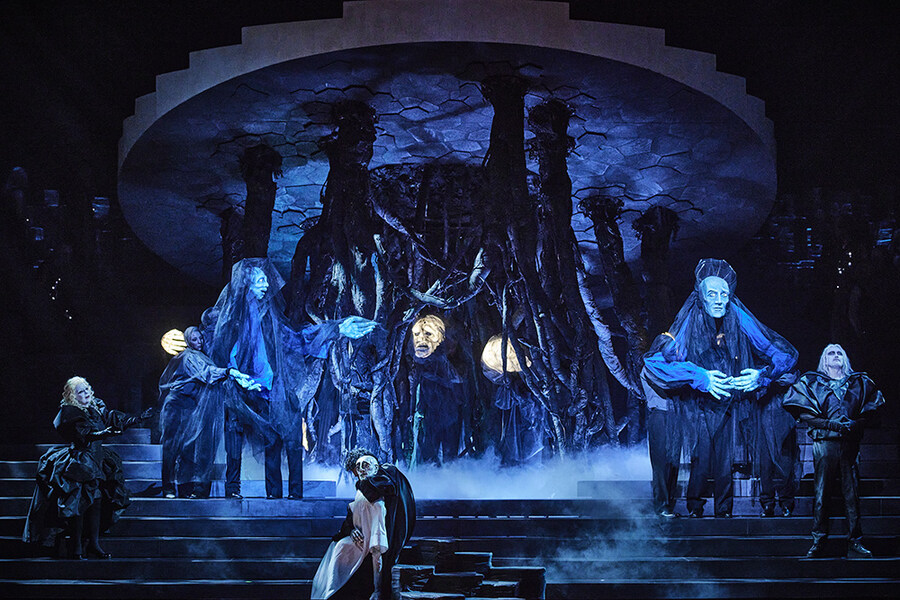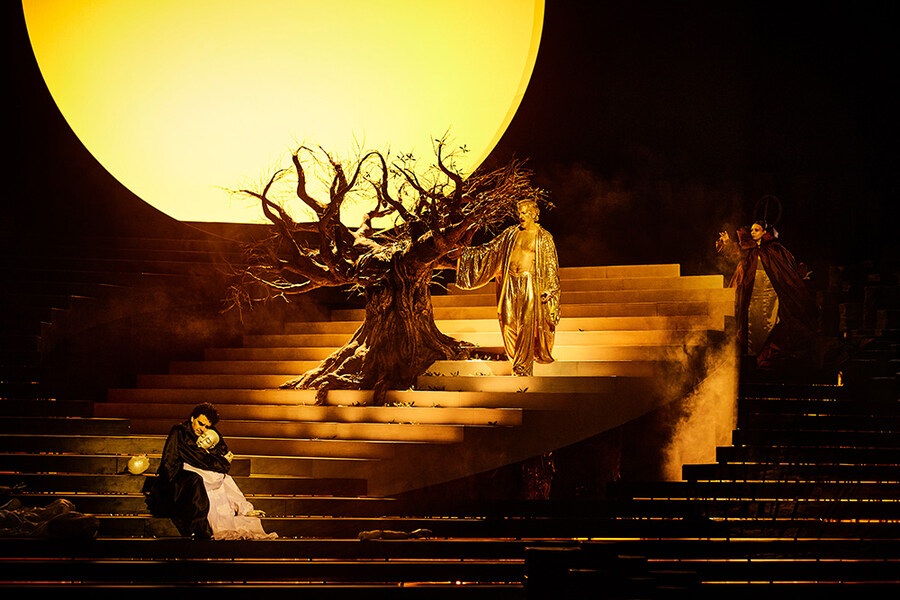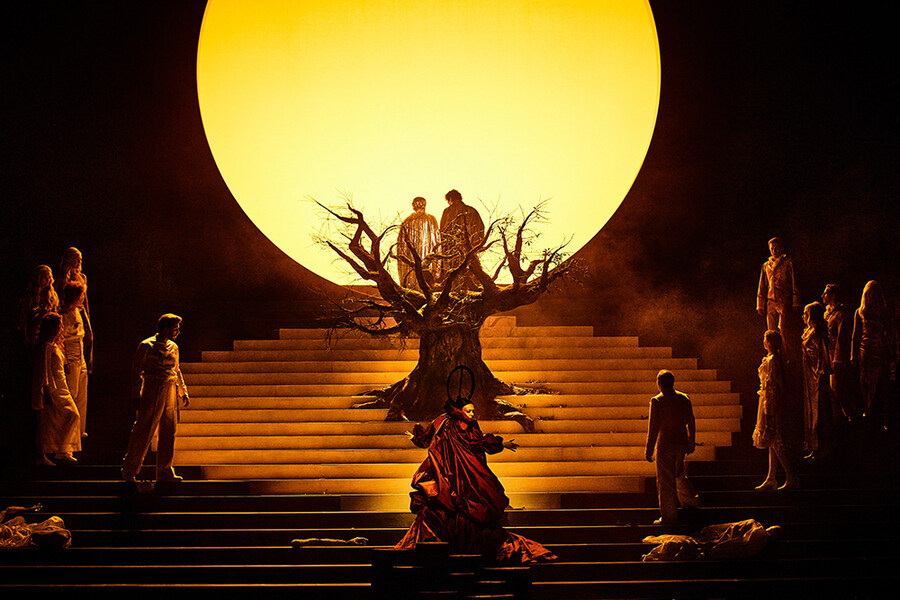Orpheus sings to vanquish death, hoping to save his dead wife from the underworld. And so it is entirely fitting that the history of opera should begin with a work celebrating the power of music.
Favola in musica in one prologue and five acts
Libretto by Alessandro Striggio
Performed in Italian with German and English supertitles
Premiere
30. April 2023
Dates & Cast
- Conductor Wolfgang Katschner
- Staging Nikolaus Habjan
- Choreographie Esther Balfe
- Set Design Jakob Brossmann
- Costume Design Cedric Mpaka
- Collaboration Kostüm Lugh Amber Wittig
- Lighting Design Fabio Antoci
- Choir Jonathan Becker
- Dramaturgy Benedikt Stampfli
- Conductor Wolfgang Katschner
- Staging Nikolaus Habjan
- Choreographie Esther Balfe
- Set Design Jakob Brossmann
- Costume Design Cedric Mpaka
- Collaboration Kostüm Lugh Amber Wittig
- Lighting Design Fabio Antoci
- Choir Jonathan Becker
- Dramaturgy Benedikt Stampfli
lautten compagney BERLIN
Project Partners: Sparkassen-Finanzgruppe Sachsen, Ostsächsische Sparkasse Dresden, Sparkassen-Versicherung Sachsen, LBBW
- La Musica (The Music) Alice Rossi
- Orfeo Rolando Villazón
- Euridice Sofia Savenko
- The Messenger Štěpánka Pučálková
- La Speranza (The Hope) Georg Bochow
- Caronte Markus Suihkonen
- Proserpina Ute Selbig
- Plutone Tilmann Rönnebeck
- Apollo Simeon Esper
- A Nymph N.N.
- Eco (Echo) Alice Rossi
- 1st Shepherd Justyna Ołów
- 2nd Shepherd Aaron Pegram
- 3rd Shepherd Joseph Dennis
- 4th Shepherd Ilya Silchuk
- 1st Ghost Aaron Pegram
- 2nd Ghost Joseph Dennis
- 3rd Ghost Ilya Silchuk
- Puppenspieler Johann Ebert, JARNOTH, Max Konrad, Anderson Pinheiro da Silva
- Conductor Wolfgang Katschner
- Staging Nikolaus Habjan
- Choreographie Esther Balfe
- Set Design Jakob Brossmann
- Costume Design Cedric Mpaka
- Collaboration Kostüm Lugh Amber Wittig
- Lighting Design Fabio Antoci
- Choir Jonathan Becker
- Dramaturgy Benedikt Stampfli
lautten compagney BERLIN
Project Partners: Sparkassen-Finanzgruppe Sachsen, Ostsächsische Sparkasse Dresden, Sparkassen-Versicherung Sachsen, LBBW
- La Musica (The Music) Alice Rossi
- Orfeo Rolando Villazón
- Euridice Sofia Savenko
- The Messenger Štěpánka Pučálková
- La Speranza (The Hope) Georg Bochow
- Caronte Markus Suihkonen
- Proserpina Ute Selbig
- Plutone Tilmann Rönnebeck
- Apollo Simeon Esper
- A Nymph N.N.
- Eco (Echo) Alice Rossi
- 1st Shepherd Justyna Ołów
- 2nd Shepherd Aaron Pegram
- 3rd Shepherd Joseph Dennis
- 4th Shepherd Ilya Silchuk
- 1st Ghost Aaron Pegram
- 2nd Ghost Joseph Dennis
- 3rd Ghost Ilya Silchuk
- Puppenspieler Johann Ebert, JARNOTH, Angelo Konzett, Anderson Pinheiro da Silva
- Conductor Wolfgang Katschner
- Staging Nikolaus Habjan
- Choreographie Esther Balfe
- Set Design Jakob Brossmann
- Costume Design Cedric Mpaka
- Collaboration Kostüm Lugh Amber Wittig
- Lighting Design Fabio Antoci
- Choir Jonathan Becker
- Dramaturgy Benedikt Stampfli
lautten compagney BERLIN
Project Partners: Sparkassen-Finanzgruppe Sachsen, Ostsächsische Sparkasse Dresden, Sparkassen-Versicherung Sachsen, LBBW
- La Musica (The Music) Alice Rossi
- Orfeo Rolando Villazón
- Euridice Sofia Savenko
- The Messenger Štěpánka Pučálková
- La Speranza (The Hope) Georg Bochow
- Caronte Markus Suihkonen
- Proserpina Ute Selbig
- Plutone Tilmann Rönnebeck
- Apollo Simeon Esper
- A Nymph N.N.
- Eco (Echo) Alice Rossi
- 1st Shepherd Justyna Ołów
- 2nd Shepherd Aaron Pegram
- 3rd Shepherd Joseph Dennis
- 4th Shepherd Ilya Silchuk
- 1st Ghost Aaron Pegram
- 2nd Ghost Joseph Dennis
- 3rd Ghost Ilya Silchuk
- Puppenspieler Johann Ebert, JARNOTH, Angelo Konzett, Anderson Pinheiro da Silva
- Conductor Wolfgang Katschner
- Staging Nikolaus Habjan
- Choreographie Esther Balfe
- Set Design Jakob Brossmann
- Costume Design Cedric Mpaka
- Collaboration Kostüm Lugh Amber Wittig
- Lighting Design Fabio Antoci
- Choir Jonathan Becker
- Dramaturgy Benedikt Stampfli
lautten compagney BERLIN
Project Partners: Sparkassen-Finanzgruppe Sachsen, Ostsächsische Sparkasse Dresden, Sparkassen-Versicherung Sachsen, LBBW
- La Musica (The Music) Alice Rossi
- Orfeo Rolando Villazón
- Euridice Sofia Savenko
- The Messenger Štěpánka Pučálková
- La Speranza (The Hope) Georg Bochow
- Caronte Markus Suihkonen
- Proserpina Ute Selbig
- Plutone Tilmann Rönnebeck
- Apollo Simeon Esper
- A Nymph N.N.
- Eco (Echo) Alice Rossi
- 1st Shepherd Justyna Ołów
- 2nd Shepherd Aaron Pegram
- 3rd Shepherd Joseph Dennis
- 4th Shepherd Ilya Silchuk
- 1st Ghost Aaron Pegram
- 2nd Ghost Joseph Dennis
- 3rd Ghost Ilya Silchuk
- Puppenspieler Johann Ebert, JARNOTH, Angelo Konzett, Anderson Pinheiro da Silva
In brief
Orpheus sings to vanquish death, hoping to save his dead wife from the underworld. And so it is entirely fitting that the history of opera should begin with a work celebrating the power of music. The premiere of Claudio Monteverdi’s »L’Orfeo« on 24 February 1607 is regarded as the birth of musical theatre. In the Semperoper, Monteverdi’s opera about the power and impotence of music can now be experienced for the first time in a new production of the original version. The conductor and lutenist Wolfgang Katschner will bring the score to life together with his orchestra lautten compagney BERLIN with period instruments. Director and puppeteer Nikolaus Habjan, a shooting star of the Austrian theatre scene, will stage the work with a mixture of singing actors and life-size puppets.
Storyline
The music tells the story of the renowned singer Orpheus, with the goal of giving people courage and hope. Orpheus and Eurydice are going to celebrate their wedding together with shepherds and nymphs. While Orpheus is still singing of his good fortune, a messenger informs him that Eurydice has died from a snake bite. Orpheus decides to descend to the underworld in order to win Eurydice back, or else to die himself. Hope accompanies Orpheus up to the banks of the river Styx, which encircles the underworld. He is unable to persuade the ferryman Charon to take him to the other shore. But when Charon falls asleep, he crosses into the realm of shadows by himself. While a chorus of spirits cheers Orpheus on, Persephone and Pluto, the royal couple of the underworld, argue. Orpheus laments his sorrow and asks the gods of the underworld to return Eurydice to him. Persephone, moved by Orpheus’s singing, convinces her husband to grant the singer’s request. Pluto, however, sets one condition: Orpheus must not look at Eurydice on their way back to the realm of the living. But Orpheus fails: walking in front of Eurydice, he looks back – and loses his beloved forever. Back on earth, Orpheus laments his fate, but he is answered only by Echo. Apollo, the god of the arts and Orpheus’s father, reminds him of the transience of happiness and sorrow on earth and takes his son with him up to heaven.
Explore
L’Orfeo – Making-of (1)
L’Orfeo – Making-of (2)
L’Orfeo – Making-of (3)
L’Orfeo
